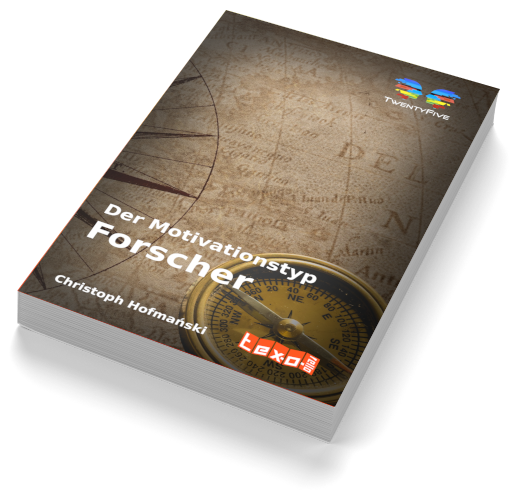Researchers
 Researchers are achievement-oriented, inquisitive people. They are concerned with objectivity, quality and meaningfulness. They deal curiously and critically with what interests them personally. Anyone who communicates with a researcher should be prepared to answer their questions factually and correctly.
Researchers are achievement-oriented, inquisitive people. They are concerned with objectivity, quality and meaningfulness. They deal curiously and critically with what interests them personally. Anyone who communicates with a researcher should be prepared to answer their questions factually and correctly.
The strongest motivations of a researcher are:
Communication
 If you want to know more about the researcher, use the pocket book: The motivational type “researcher” (german edition). Here you will get the important information about the basic needs and about the typical characteristics, relationships and communication of the researcher. In addition, you will read what the researcher can do for his well-being, how he learns most easily and which professions suit him. The book also includes a checklist for all important decisions.
If you want to know more about the researcher, use the pocket book: The motivational type “researcher” (german edition). Here you will get the important information about the basic needs and about the typical characteristics, relationships and communication of the researcher. In addition, you will read what the researcher can do for his well-being, how he learns most easily and which professions suit him. The book also includes a checklist for all important decisions.
In order to make communicative contexts transparent and understandable, the mindful communication badge has been developed as an intuitive helper.
 Would you like to get your own mindful communication badge for the signum of your emails? Just invest five minutes at https://mcb.senseaition.com. A mindful communication badge is of course free of charge.
Would you like to get your own mindful communication badge for the signum of your emails? Just invest five minutes at https://mcb.senseaition.com. A mindful communication badge is of course free of charge.
 If you want a detailed analysis of your personal motivations and basic needs and would like to go deeper into TwentyFive, you can purchase a motivation portrait according to TwentyFive. You can find explanations of TwentyFive in various books and, of course, from any specialist with a psychological education.
If you want a detailed analysis of your personal motivations and basic needs and would like to go deeper into TwentyFive, you can purchase a motivation portrait according to TwentyFive. You can find explanations of TwentyFive in various books and, of course, from any specialist with a psychological education.
With the tools of sense.AI.tion GmbH there are possibilities to use TwentyFive in everyday work. These facilitate processes of recruiting, personnel development, personnel management. In addition, the tools make communication transparent, understandable and bring you closer to customers and partners.